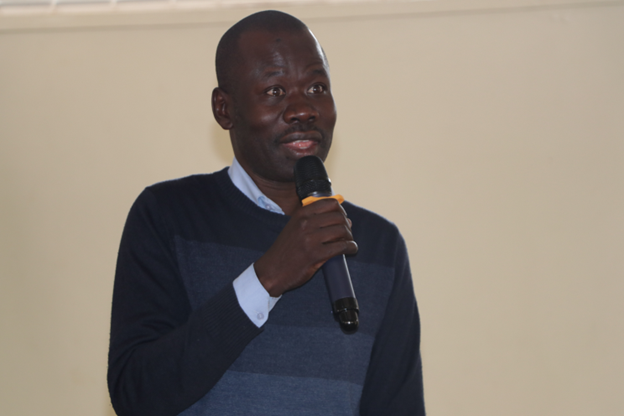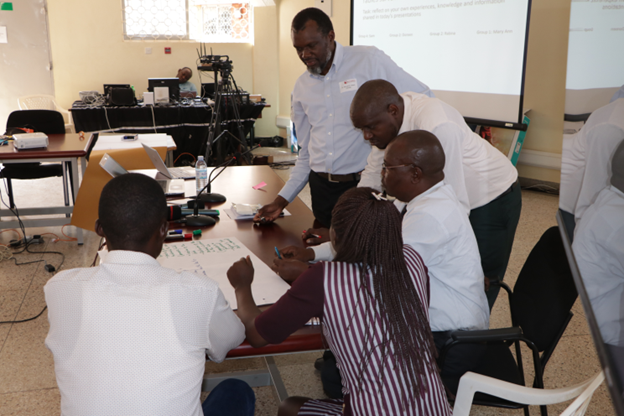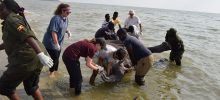Stakeholders to take on Electronic Rabies Surveillance using a One Health Approach
Stakeholders in the Rabies Elimination project in Uganda (eRabies) have intensified efforts aimed at the use of electronic Rabies Surveillance using a One Health approach in the efforts towards elimination of rabies in Uganda.
A two-day workshop was convened at the College of Veterinary Medicine, Animal Resources and Biosecurity (CoVAB), Makerere University on 28th-29th September 2023, during which the stakeholders deliberated on a number of proposals for the best applicable surveillance tools to address One Health concerns in the effort towards the elimination of Rabies.

Prof. Clovice Kankya, Head of Department, Biosecurity, Ecosystems and Veterinary Public Health at CoVAB
‘The purpose of the meeting is to hear from various actors and see what works for us, to enable us collect information and have it shared in a sustained way with One Health as a key component’ said Prof. Clovice Kankya, the Head, Department of Biosecurity, Ecosystems and Veterinary Public Health at CoVAB, at the start of the meeting held in the Centre for Biosecurity and Global Health.
Kankya noted that with one year of implementation to date, the eRabies project was progressing well drawing a lot of support from the implementing local Governments of Kyegegwa, Soroti and Kampala Capital City Authority that spearhead the community engagements and other related activities. He said the graduate fellows from the Ministry of Health and Ministry of Agriculture, Animal Industry and Fisheries supported by the project were also on schedule.
He said Rabies is a global challenge being a zoonotic disease affecting the entire world more so here in Africa where there is close interaction between the wild animals and the human population. The Uganda Wildlife Authority, he said, was brought on board specifically Queen Elizabeth National Park to address some of the challenges affecting people drawing from the wild animals.

Prof. James Acai- Okwee, Deputy Principal CoVAB officiated at the opening
The Deputy Principal CoVAB, Prof. James Acai Okwee, in his opening remarks noted through the eRabies project, Makerere University and the host CoVAB were consolidating efforts towards the control of rabies in Uganda. ‘In as much as Rabies is a killer 100%, it is also preventable 100%’ observed Prof. Acai, adding that Makerere University and CoVAB specifically have been involved in such efforts through filed activities, vaccinations and animal welfare programs aimed at the control of rabies. He said through research, such efforts were to be intensified from a scientifically informed point of view.

Prof. Sonja Hartnack, from the Vetsuisse Faculty, University of Zurich gives the background to the project
Prof. Sonja Hartnack, from the Vetsuisse Faculty, University of Zurich, one of the partners gave an overview of the project. She said the four-year project has seven different work packages while emphasizing that presently, the stakeholders were addressing work package one, that entails Surveillance systems and integrated bite case management. She noted that the communities were crucial in the rabies control efforts and specifically in identifying the barriers for rabies control through research interventions and the development of educational materials for awareness creation.
She made reference to the World organization for Animal Health (WOAH) recommended practices that points out that dog owners are clearly identified as one way through which the barriers to dog vaccination can be addressed in the communities and emphasized responsible dog ownership.

Group work
She said it was important to assess which vaccinations approaches are most successful in terms of vaccination coverage, whether there were static points vaccinations, or linked to institutions like Schools or other Veterinary activities or even human health related activities. She said through quantitative and qualitative research, the eRabies project was set to establish what works. She also pointed out the need to increase the laboratory capacity at regional levels as well as taking on rapid tests in the field.
Prof. Sonja Hartnack said the deliberations in the meeting were to inform the efforts towards having an integrated bite case management (IBCM) system by looking at different systems, picking out key data elements, reviewing the challenges of the existing processes for a proper One Health approach.

Dr. Andrew Kambugu, Director, Infectious Disease Institute (IDI) affirms IDI’s support to the project
Dr. Andrew Kambugu, Director, Infectious Disease Institute (IDI) one of the key partners in the eRabies project extended appreciation to the Swiss Government and the Swiss National Science Foundation (SNSF) for the grant that is supporting the implementation of the activities. He referred to COVID-19, a Zoonotic disease that affected many people as having come from the contact between animals and humans. He said the model that would come out of the meeting was to be relevant to many. He emphasized the need for increased collaboration between different agencies in Africa, where he noted that many were working in silos. He affirmed that IDI was to give all relevant support needed in the erabies project.
The deliberations in the workshop shared experiences from varied stakeholders that included the Infectious Diseases Institute experiences of Rabies Surveillance in West Nile region, the respective implementing Local Governments, Ministry of Health and Ministry of Agriculture Animal Industry and Fisheries.

Group work presentations by participants
Participants identified some of the challenges experienced in timely dog bites reporting that need to be addressed in the surveillance. They included late reporting by the victims, failure to capture data from the private Veterinary Medicine practitioners that handle a number of cases in the communities, omission of the wildlife Veterinarians in the reporting system and the little interaction between the Human Health practitioners and the Veterinarians, coupled with the limited data sharing avenues.

Participants in a plenary session
The eRabies project is implemented by Makerere University College of Veterinary Medicine, Animal Resources and Biosecurity (CoVAB), Infectious Diseases Institute (IDI) in collaboration with the Vetsuisse Faculties, Universities of Bern and Zurich from Switzerland. It is contributing to efforts towards elimination of Rabies by 2030.
Story Harriet Musinguzi







